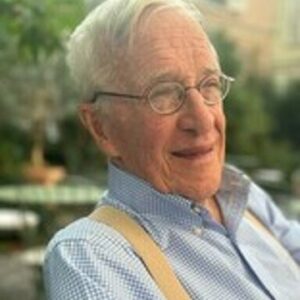Standish Meacham Jr., historian of Victorian and Edwardian England and Sheffield Regents Professor emeritus at the University of Texas at Austin, died on June 13, 2024, in Portland, Maine. He was 92 years old.

Courtesy Standish family
Born on March 12, 1932, in Cincinnati, Standish attended the Taft School in Watertown, Connecticut, before graduating from Yale University in 1954. After a year’s study at King’s College, Cambridge, he served for two years as a lieutenant in the US Army. Standish earned his PhD in history from Harvard University in 1961. He taught at Harvard for five years and became senior tutor of Winthrop House. In 1966, he joined the history department at the University of Texas at Austin, where he remained until his retirement in 1998. Standish was attracted to Texas as an “academic frontier,” free from the restrictions of the Ivy League.
The arc of Standish’s scholarship began at Harvard, where he researched his first two books, biographies of two prominent religious figures: Henry Thornton of Clapham, 1760–1815 (Harvard Univ. Press, 1964) and Lord Bishop: The Life of Samuel Wilberforce, 1805–1873 (Harvard Univ. Press, 1970). These gracefully written, meticulously researched, and deeply humane biographies remain the standard treatments of their lives.
At the University of Texas, Standish’s scholarly life featured two points of departure. Drawing on the extensive resources of the Gernsheim Collection of photography at the Harry Ransom Center, Standish helped organize an exhibit on street photographer Paul Martin. This experience and the increasing importance of social history awakened in him an enduring interest in the history of the British working class and leftist politics. Standish explored social history, progressive politics, and culture in A Life Apart: The English Working Class, 1890–1914 (Harvard Univ. Press, 1977); Toynbee Hall and Social Reform, 1880–1914: The Search for Community (Yale Univ. Press, 1987); and Regaining Paradise: Englishness and the Early Garden City Movement (Yale Univ. Press, 1999). In “‘The Sense of an Impending Clash’: English Working-Class Unrest before the First World War” (American Historical Review, 1972), he argued that “a historian’s particular task is the tracing and untangling of connections,” a commitment that marked all his work, whatever the topic.
Standish passed on his devotion to historical study and his high standards of scholarship to his students. He taught both large lecture surveys and small specialized seminars to appreciative undergraduates. He also mentored graduate students, not only during their student years but also throughout their careers.
Standish chaired the history department in 1970–72 and 1984–88, during which time he pushed for greater faculty input in university decision-making and more diverse faculty hires. From 1989 to 1991, he served as dean of the College of Liberal Arts, becoming embroiled in debates over higher education’s role while he advocated for a more inclusive and multicultural university. When he approved a new English course on issues of racism and sexism, conservative faculty and administrators denounced it as “propaganda,” and the controversy attracted national media coverage. The university president “postponed” the course, and Standish resigned the deanship. Outside the university, Standish was active in progressive causes, serving on the board of Planned Parenthood of Central Texas and as a board member and president of Texas Housers, the state’s leading affordable housing authority.
Standish married Sarah Shartle in 1957, with whom he raised three children, Edith, Louisa, and Sam, who in time increased the family with eight grandchildren. Standish and Sarah divorced in 1993. His subsequent marriage to Steven Salzman ended in divorce in 2013.
A devotee of theater and music, Standish was an accomplished pianist. He will be remembered by his colleagues and friends for his wry sense of humor and his wealth of anecdotes. When his good friend, the late Ann Richards, was governor of Texas, she invited him to a dinner in honor of Queen Elizabeth II and Prince Philip of the United Kingdom in 1991. Richards introduced Standish to the royal couple as “an expert on the British Labour Party.” Unimpressed, Philip responded tartly, “Good luck with that!”
George Robb
William Paterson University of New Jersey (emeritus)
Gail Savage
St. Mary’s College of Maryland (emerita)
This work is licensed under a Creative Commons Attribution-NonCommercial-NoDerivatives 4.0 International License. Attribution must provide author name, article title, Perspectives on History, date of publication, and a link to this page. This license applies only to the article, not to text or images used here by permission.